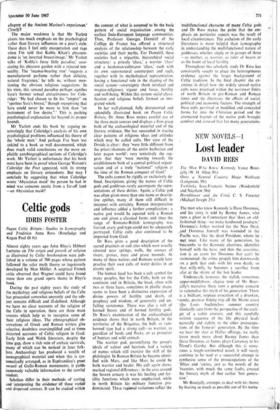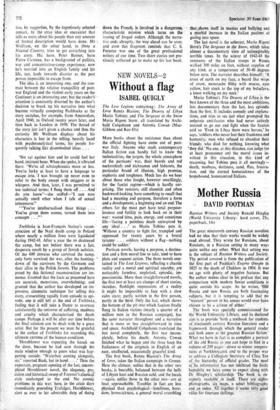NEW NOVELS-1
Lost leader
DAVID REES
Onto a Neutral Country Hugo Wolfram (Longmans 30s) Trehlinka Jean-Francois Steiner (Weidenfeld and Nicolson 36i) Hornblower and the Crisis C. S. Forester (Michael Joseph 25s) The man who knew Kennedy is Dave Doremus, and his story is told by Barney James, whet runs a plant in Connecticut that 'does an old- fashioned thing—we make hardwood products.' Dorem. us's father worked for the New Deal, Doremus himSelf was wounded in the Pacific war, like the dead President, whom he iiset. once. Like many of his generation, he ituecumbs to the Kennedy charisma, identifies himself with the hero, and thus the assassina- tion is an event for Doremus that can't be surmounted; the crime propels him downwards on. a path that ends with his own death, so that willy-nilly he becomes a sacrifice from afar at the shrine of the lost leader, Underneath, however, the stylish, sometimes upper-middlebrow. elegiac tone of Mr Bour- jally's narrative there runs a genuine concern to rationalise this myth of his generation. There is a brilliant, setpiece evocation of a drunken, +randy, postwar fishing trip off the. Maine coast Louis Auchincloss summer country ironically seen froin the perspective of the cock- pit of a cabin cruiser), and this carefully written sequence of the life physical leads naturally and rightly to the other preoccupa- tions of the Jameses' generation. By the time we hear the shot at Dallas offstage, we really know much more about Barney James than pave Doremus as James plays Carraway to his Thend's Gatsby. But although this is some- times a tough-sentimental novel, it will surely continue to be read as a successful attempt to synthesise some of the preoccupations of the 'fifties and 'sixties, just as the novels of the Uenties, with much the same faults, created the literary myth of that earlier 'lost genera- tion.'
Mr Bourjally attempts to deal with his theme by leaving as much as possible out of his narra-
tive, by suggestion, by the ingeniously selected remark, by the stray idea or encounter that tells us more about his people than any amount of formal description would have done. Mr Wolfram, on the other hand, in Onto a Neutral Country, tries to get everything into his story. His hero, Peter Bennet, born Pietro Caruana, has a background of politics, war and concentration-camp experience; now he's married into an English family and his life, too, leads towards disaster as the past proves impossible to escape from.
The idea is an interesting one, and the con- trast between the relative tranquillity of post- war England and the violent early years on the Continent is an interesting one; but the reader's attention is constantly diverted by the author's decision to break up his narrative into what become virtually competing flashbacks as the story switches, for example, from Amsterdam, April 1940, to Oxford twenty years later, and then back to London in 1950. The thread of the story just isn't given a chance and thus the curiosity Mr Wolfram displays about his characters is lost in the telling, heavily laced with psychoanalytical terms, his people fre- quently talking like disembodied ideas . . .
'She sat against him and he could feel her hand, insistent bone. When she spoke, it vibrated there. "We're all schizophrenics more or less. You're lucky at least to have a language to escape into. I was brought up never even to refer to the body except with sniggers or in whispers. And then, later, I was permitted to use technical terms; I flung them off . . . And do you know"—she sniffed—"I can now actually smell ether when I talk of sexual intercourse."
"You've intellectualised these things . . You've given them names, turned them into concepts . . ."' Treblinka is Jean-Francois Steiner's recon- struction of the Nazi death camp in Poland where nearly a million Jews were liquidated' during 1942-43. After a year the ss destroyed the camp, but not before there was a last, desperate revolt by a group of Jewish activists. Of the 600 inmates who survived the camp, only forty survived the war, after the hunting- down of the ,survivors by tlae Germans and their allies in the Polish forests. The problems posed by this fictional reconstruction are im- mense. Granted that the facts as presented here are accurate, monstrous, overwhelming; and granted that the author has developed an im- pressive, cinematic technique for telling this story, crosscutting rapidly from episode to epi- sode, one is still left at the end of Treblinka,, feeling that it will take a Dante to re-create satisfactorily the universe of suffering, madness and cruelty which characterised the death camps. Perhaps it will be after our time before the final solution can be dealt with by a great , artist. But for the present we must be grateful to the author of Treblinka for recording this ultimate extreme of the human condition.
'Hornblower was expecting the knock on the door, because he had seen through the main window enough to guess what was hap- pening outside. "Waterboy coming alongside, sir," reported Bush, hat in hand . . Thus the expectant, pregnant opening of the last, uncom- pleted Hornblower novel, the elegance, prez. cision and historical sweep of Forester's classical style unchanged to the end. No cosmic problems in this war; here, in the crisis days immediately preceding Trafalgar, Hornblower, , alert as ever to his admirable duty of doing' down the French, is involved in a dangerous, characteristic mission which turns on the issuing of forged orders. Although the narra- tive ends abruptly, the way ahead can be seen; and even this fragment reminds that C S. Forester was one of the great professional writers of our time. Two short stories not pre- viously collected go to make up his last books











































 Previous page
Previous page